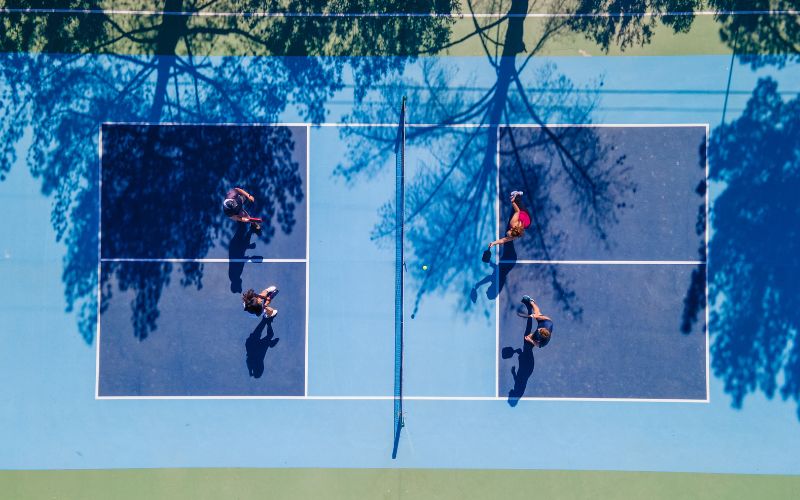Pickleball, a beloved and rapidly growing sport, boasts an intriguing name that piques curiosity. How did pickleball get its name? What’s the story behind this unique appellation? In this article, we explore the fascinating history and anecdotes surrounding the origin of the term “pickleball.”
The Genesis of Pickleball
Pickleball, a game that emerged in 1965, owes its creation to Joel Pritchard, Bill Bell, and Barney McCallum. Seeking a new recreational pursuit for their families, these three individuals embarked on a journey of experimentation with various equipment and regulations, eventually giving rise to what we now recognize as pickleball.
The Architects of the Game
Joel Pritchard, a former US congressman hailing from Washington state, brought his experiences from playing badminton and tennis to the table. Bill Bell, a prosperous entrepreneur with a penchant for sports, joined forces with Barney McCallum, a retired engineer renowned for his problem-solving skills.
Their collaborative efforts resulted in the birth of a captivating and inclusive game designed to cater to individuals of all ages and skill levels.
Interestingly, it was Barney who conceived the notion of utilizing a perforated plastic ball to moderate the game’s pace, rendering it more accessible and enjoyable for players of diverse backgrounds and abilities.
Why is it Called Pickleball?
Bainbridge Island: The Birthplace of Pickleball
The story begins in the mid-1960s on Bainbridge Island, Washington State, where three friends, Joel Pritchard, Bill Bell, and Barney McCallum, found themselves in search of a new and enjoyable sport to engage in with their families. These individuals, including successful businessman Joel Pritchard, we’re no strangers to athletic pursuits and recreational activities.
The Dog Story: A Popular Legend
Legend has it that the name “pickleball” traces back to the Pritchard family dog, named Pickles.
Joel Prichard’s daughter and a neighbor named Jim Brown each selected a Cockapoo puppy from a neighbor offering the litter for adoption. The Prichard family affectionately named their puppy “Pickles.”
As the story goes, during the initial rounds of the nascent racquet game, which would later be recognized as pickleball, Pickles the dog developed a habit of retrieving the plastic Wiffle ball with its mouth and dashing off the court.
According to accounts from the McCallum family, as well as the Browns—who were among the first enthusiasts of pickleball—the sport earned its moniker from the family dog. They recollect the precise evening they christened it after “Pickles” the dog, reminiscing about the lively atmosphere in the Prichard cabin’s living room. They even recall jubilantly celebrating the discovery of this amusing name for their newfound pastime.
This canine antics inspired the name of the sport, evoking fond memories and a touch of humor.
Pickle Boat or Pickleball? Debunking the Myth
While the dog story remains a charming anecdote, there are a few different stories regarding how pickleball truly acquired its name. Some sources suggest that the term “pickleball” stemmed from the combination of different sports played by the Pritchard family, rather than from the family dog alone.
Another intriguing theory proposes that the sport was named after the “pickle boat,” a term used in crew races to denote the last boat to return with its catch. This notion hints at the sport’s inception from varied sources and its emergence as a delightful pastime rather than a competitive pursuit.
An alternative account regarding the origins of the name pickleball involves what is known as the “pickle boat” narrative. According to the Prichard family, Joan Prichard, Joel’s wife and a former competitive rower, proposed the name pickleball as it reminded her of a peculiar term from her rowing days: the pickle boat.
Joan Prichard penned an article in the Parkersburg, West Virginia News and Sentinel, where she expressed her connection between pickleball and the concept of a pickle boat. Initially perplexed by the term, Joan delved into research and discovered that a pickle boat referred to weaker or mismatched crew teams in rowing circles.
However, a glaring inconsistency arises when comparing this account to the “dog story.” Both Joan Prichard and her daughter Peggy Pritchard-Olson have refuted the notion that their family dog, Pickles, played a role in naming the sport. Joan Prichard explicitly stated in the News and Sentinel that Pickles did not enter the picture until two years after the game’s inception, emphasizing that the dog was named after the game, not the other way around.
This perspective was corroborated by Joan Prichard’s daughter in 2005, underscoring that the dog was indeed named after the game, not vice versa.
Joel Pritchard’s stature as a prominent politician ensured that his life was well-documented, including his involvement in the early days of pickleball. Oral histories conducted by the Washington State Secretary of State Oral History Project shed light on Joel Pritchard’s views on the sport’s nomenclature. Pritchard himself dismissed the notion that the game was named after Pickles, affirming that the dog came into the picture later and was named after the game itself.
Despite refutations from multiple members of the Prichard family, the “dog story” has persisted in various media outlets and online discussions within pickleball communities. Some speculate that the “pickle boat” narrative lacked the appeal of the endearing puppy story and that the decision to prioritize the dog’s role in the sport’s history was deliberate, given its broader appeal and resonance among enthusiasts.
In essence, the debate surrounding the origins of pickleball’s name continues to spark intrigue and speculation, underscoring the allure of unraveling the sport’s colorful history. Regardless of the prevailing narrative, pickleball’s name remains a testament to its quirky beginnings and enduring legacy in the realm of recreational sports.
The Evolution of Pickleball
From Humble Beginnings to Global Recognition
Regardless of its origins, pickleball has transcended its humble beginnings to become a popular sport enjoyed by millions worldwide. What began as a backyard game on Bainbridge Island has evolved into a global phenomenon, with dedicated pickleball courts and communities sprouting up in recreation centers, schools, and parks.
The Pickleball Association: A Driving Force
The establishment of the USA Pickleball Association in 1984 further solidified the sport’s identity and provided a platform for its growth. This organization has been instrumental in promoting pickleball through tournaments, publications like Pickleball Magazine, and the establishment of official pickleball court dimensions and rules.
A Legacy of Innovation and Fun
In essence, the name “pickleball” encapsulates the spirit of innovation, creativity, and camaraderie that defines the sport. Whether inspired by a playful family dog, a nautical term, or a blend of various sports, the moniker reflects the whimsical and inclusive nature of pickleball.
While the true origins of the name may remain shrouded in lore and speculation, one thing is certain: pickleball’s name adds to its charm and allure. It serves as a reminder of the sport’s unconventional roots and its journey from obscurity to mainstream popularity.
Conclusion
In conclusion, the game “pickleball” embodies the essence of this dynamic and engaging sport. Whether rooted in family anecdotes, nautical terminology, or a blend of both, the name evokes a sense of whimsy and nostalgia. As pickleball’s popularity continues to soar, its name remains a testament to its rich history and enduring appeal. So, the next time you step onto the court to play pickleball, remember the intriguing tale behind its distinctive name.
FAQs About the Origins of Pickleball
1. Why is it Called Pickleball?
The name “pickleball” has origins rooted in whimsical anecdotes and colorful tales. While the precise origin remains debated, one popular theory suggests that the sport was named after Joel Pritchard’s family dog, Pickles, who allegedly retrieved the plastic Wiffle ball during early rounds of the game. Another theory proposes that the name was inspired by the term “pickle boat,” a reference to mismatched crew teams in rowing circles. Regardless of the narrative, pickleball’s name reflects the sport’s quirky and inclusive nature.
2. What is the Significance of Bainbridge Island in Pickleball’s History?
Bainbridge Island, Washington State, holds a significant place in pickleball’s history as the birthplace of the sport. In the mid-1960s, Joel Pritchard, Bill Bell, and Barney McCallum, seeking a new recreational activity for their families, pioneered the game on Bainbridge Island. Their collaborative efforts and innovative spirit laid the foundation for pickleball’s enduring legacy.
3. What Role Did Joel Pritchard, Bill Bell, and Barney McCallum Play in Pickleball’s Invention?
Joel Pritchard, a former US congressman, joined forces with Bill Bell, a successful entrepreneur, and Barney McCallum, a retired engineer, to create pickleball. Drawing from their diverse backgrounds and shared passion for sports, the trio developed pickleball as a fun and accessible game for individuals of all ages and skill levels.
4. How Did the Legend of Pickles the Dog Influence Pickleball Name?
According to legend, Joel Pritchard’s family dog, Pickles, played a central role in naming the sport. Allegedly, Pickles retrieved the plastic Wiffle ball during early pickleball matches, inspiring the sport’s quirky name. However, conflicting accounts and alternative theories suggest that the name may have originated from nautical terminology or a blend of various sports played by the Pritchard family.
5. What Contributions Did the USA Pickleball Association Make to the Sport?
Established in 1984, the USA Pickleball Association (USAPA) played a pivotal role in promoting and standardizing pickleball. Through organizing tournaments, publishing Pickleball Magazine, and defining official court dimensions and rules, the USAPA provided a platform for the sport’s growth and recognition on a national and global scale.





